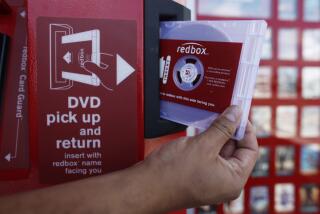Kirch’s Core Holdings Seek Creditor Protection
BERLIN — Media mogul Leo Kirch’s core television and rights-trading businesses filed for protection from creditors Monday, heralding the biggest bankruptcy in post-World War II Germany and rocking national institutions from the chancellery to the Bundesliga soccer league.
With a legal declaration of insolvency for KirchMedia and KirchPayTV, the main holdings of Kirch Group, the 75-year-old founder bowed out of his namesake empire after more than 40 years as one of this country’s most spectacular rags-to-riches stories.
Kirch’s media holdings collapsed under a load of debt, about $1.2 billion of the $5.7 billion owed from all of his enterprises. The debt includes $352 million owed to Hollywood studios for film rights.
A Bavarian farm boy whose first rights deal was negotiated in his car, Kirch built Germany’s No. 2 media conglomerate from scratch and was for decades a major influence on conservative politicians, including his close friend and former Chancellor Helmut Kohl.
With Kirch now out of the picture, creditors announced the formation of a three-man receivership charged with preventing a full-scale breakup of the holding company and sale of its assets to foreign rivals.
Bavarian Gov. Edmund Stoiber, who is challenging Chancellor Gerhard Schroeder for the leadership in the Sept. 22 federal elections, vowed to see the main media operations continue and as many of the group’s 10,000 jobs preserved as possible.
But Stoiber was inundated with criticism from political opponents for allowing a Munich-based bank, half-owned by his state government, to extend poorly secured loans to the privately held company whose financial plight has been known for years.
The bank, Bayerische Landesbank, is the most exposed of Kirch’s many creditors, holding $1.7 billion of the group’s $5.7-billion debt.
Several other bankruptcies and loan defaults over the last year have hit the bank hard and exposed Stoiber’s government to accusations of cronyism.
The state bank, along with three other major creditors--Commerzbank, DZ Bank and HVB Group-- appointed the restructuring team shortly after the insolvency filing and announced a search for new investors with media expertise to manage the profitable Kirch companies once they are spun off from the unsalvageable assets.
KirchMedia includes a controlling 52.5% stake in Germany’s leading broadcaster, ProSiebenSat1, as well as Europe’s biggest film and television library and exclusive rights to broadcast World Cup soccer. Other Kirch holdings include rights to broadcast Formula One auto racing and a 40% stake in Axel Springer Verlag, publisher of Germany’s largest circulation newspaper, Bild.
Kirch also owns broadcasting rights to the Bundesliga, and his $350-million annual payment provides as much as half of the teams’ income and much of their ability to pay lavish salaries for top players.
With the soccer teams’ solvency threatened by Kirch’s collapse, the federal government last week said it was considering making as much as $180 million in bridge credits available to the Bundesliga, a move criticized by economists as a misuse of taxpayer funds to appease sports fans in an election year.
At a news conference in Munich after the insolvency filings, officials of the main creditor banks announced the appointment of Kirch lawyers Wolfgang van Betteray and Hans-Joachim Ziems along with local court officer Michael Jaffe as receivership administrators.
The insolvency team will draft a restructuring plan for Kirch in consultation with the creditors, who include foreign media rivals Rupert Murdoch of Australia and Italian Prime Minister Silvio Berlusconi as well as Lehman Bros. Holdings Inc., Hollywood studios, Credit Suisse Group and J.P. Morgan Chase & Co.
The new administrators, who take over from Kirch and Deputy Chief Executive Dieter Hahn, said they will seek new investors and encourage those already holding Kirch debt to provide interim funding in exchange for shares in a media group they hope to found.
Axel Springer was reported by German media to be agreeable to the restructuring attempt and will hold off activating a “put” option that would require Kirch to pay the publisher $669 million. Other major creditors such as Deutsche Bank, which had called due a $400-million loan, also indicated to the receivership team that they would be patient for a while longer.
Kirch had been in talks with Murdoch, Berlusconi and the Hollywood studios he owes $435million, but those negotiations collapsed last week after months of unsuccessful efforts to craft a rescue plan.
Betteray met with creditors to discuss how best to redeem the value of surviving assets, most notably the World Cup broadcasting rights that could revert to the sport’s governing body in the event of bankruptcy. The TV rights for the games this summer in Japan and South Korea, as well as those for the 2006 World Cup, are being transferred to a Switzerland-based Kirch enterprise to shield them from rivals.
Kirch’s biggest creditor is Bayerische Landesbank, half-owned by the state of Bavaria and already reeling from massive loan defaults by other insolvent companies such as construction giant Philipp Holzmann and Fairchild Dornier, the world’s third-largest manufacturer of short-haul aircraft that filed for protection from creditors last week.
The Bavarian bank’s poorly secured loans to Kirch may damage Stoiber’s chances of unseating Schroeder as they suggest bad economic judgment and undermine his portrayal of his state as more modern and better managed than the nation as a whole.
“The risk analysis of these loans was questionable and must be investigated,” Schroeder told journalists after a meeting here with leaders of his Social Democratic Party. He accused Bavarian politicians and bankers of incompetence and indecency in exposing the state to a business empire built on a mountain of debt and dubious investments.
Stoiber defended his government’s support of Kirch during troubled times, saying the entrepreneur has created “the most important magnet” for the development of Munich into one of Germany’s leading media centers, where more than 100,000 are employed.
Although Kirch’s collapse is a major embarrassment for Stoiber, who goes to Washington this week for an official visit, it also is unlikely to leave Schroeder unscathed.
Unemployment has soared above the psychologically important barriers of 10% and 4million people, and additional job losses incurred by Kirch will worsen the chancellor’s economic report card as voters ponder their future from the depths of a recession.
Kirch’s empire has survived for years on last-ditch reorganizations and strategic asset disposals, but the accelerating financial hemorrhage from his Premiere pay-TV operation and an advertising slump imposed by the recession brought the reclusive Bavarian to ruin.
Premiere lost nearly $800 million last year and has fallen far short of company forecasts of 4million subscribers by now, with only 2.4 million willing to shell out for sports and movie channels in a country in which more than 30 channels are free.
Kirch founded his company in 1959, when he acquired the rights to Italian filmmaker Federico Fellini’s “La Strada” during a Mediterranean car trip and sold them to German television stations. KirchMedia’s library now contains more than 15,000 hours of film and TV programming, but the hefty sums Kirch paid in recent years to acquire and replenish Hollywood products are among the expenditures that mired him in debt.
It was a missed $132-million payment to Sony Corp.’s Columbia Tri-Star last month that set in motion the legally mandated insolvency process.
Germany now is Europe’s biggest market, and its media outlets are domestically owned despite a lack of legal limits on foreign influence.
Stoiber and other politicians engaged in the insolvency process have called for national control of the Kirch assets to be spun off to prevent their acquisition by Murdoch, Berlusconi or other foreign magnates interested in gaining a larger stake of the German market.
More to Read
The biggest entertainment stories
Get our big stories about Hollywood, film, television, music, arts, culture and more right in your inbox as soon as they publish.
You may occasionally receive promotional content from the Los Angeles Times.











